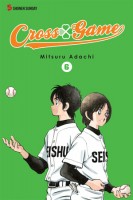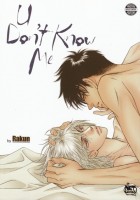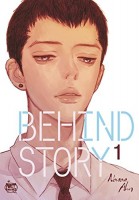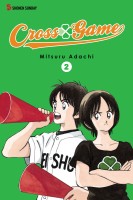My News and Reviews
Okay! Last week I submitted my promotion dossier at work, which means I’ll be able to start paying more attention to Experiments in Manga again. I still have a few other life things preoccupying me at the moment, but I’m hoping to get back to my normal posting schedule by the beginning of the new year if not before. That being said, I only posted one in-depth review last week. Soji Shimada’s classic mystery novel The Tokyo Zodiac Murders was recently re-released in English, which seemed as good an excuse as any to get around to reading it. According to this interview with Shimada, if The Tokyo Zodiac Murders does well, the next book in the series might be translated, too, which I would definitely like to read.
As for other interesting things found online: Seven Seas’ ten-day licensing spree has now wrapped up. (The new license tag on Seven Seas’ tumblr is probably still the easiest place to see them all at once.) Out of all the announced titles the one I’m most curious about is Ichiya Sazanami’s Magia the Ninth which features master composers as demon hunters with music-based magic. (Sazanami is the creator of Black Bard which I likewise couldn’t resist because of the combination of music and magic.) And in case you need to catch up on all of the anime, manga, and light novel licenses announced in 2015, Reverse Thieves has you covered. Also of note, Manga Brog has translated an excerpt of an interesting interview of Kentaro Miura, the creator of Berserk.
Quick Takes
 Captain Ken, Volumes 1-2 by Osamu Tezuka. I think that I’ve mentioned here before that I happen to have a particular fascination with Mars, which was one of the primary reasons that I was interested in reading Captain Ken. Of course, it didn’t hurt that series was also created by Tezuka. (Though granted, I would love to see more classic manga that isn’t by Tezuka released in English.) Captain Ken is basically a western in space—Mars has been deliberately developed to be reminiscent of the American Southwest, the primary mode of transportation is by (robotic) horse, and the Martians have met with the same tragic fate as the Native Americans. The series is an odd mashup of science fiction and western genre tropes and American history, including references to World War II and the dropping of the atomic bomb. (The portrayal of Americans, perhaps justifiably, isn’t especially flattering.) Captain Ken explores the same themes of anti-war and anti-discrimination found in many of Tezuka’s other manga. Overall, it’s an entertaining adventure story with a rather bittersweet ending.
Captain Ken, Volumes 1-2 by Osamu Tezuka. I think that I’ve mentioned here before that I happen to have a particular fascination with Mars, which was one of the primary reasons that I was interested in reading Captain Ken. Of course, it didn’t hurt that series was also created by Tezuka. (Though granted, I would love to see more classic manga that isn’t by Tezuka released in English.) Captain Ken is basically a western in space—Mars has been deliberately developed to be reminiscent of the American Southwest, the primary mode of transportation is by (robotic) horse, and the Martians have met with the same tragic fate as the Native Americans. The series is an odd mashup of science fiction and western genre tropes and American history, including references to World War II and the dropping of the atomic bomb. (The portrayal of Americans, perhaps justifiably, isn’t especially flattering.) Captain Ken explores the same themes of anti-war and anti-discrimination found in many of Tezuka’s other manga. Overall, it’s an entertaining adventure story with a rather bittersweet ending.
 Cross Game, Omnibuses 6-8 (equivalent to Volumes 12-17) by Mitsuru Adachi. I still don’t have much of an interest in baseball when it comes to real life, but I’m completely invested in the sport when it comes to Cross Game. I’ve come to care tremendously about the characters in the series and, because baseball is incredibly important to so many of them, by proxy the baseball is important to me as well. Cross Game‘s last three omnibuses focus on the final year of high school baseball for Ko and his classmates. In fact, the eighth omnibus is almost entirely devoted to a single game—the last opportunity for the Seishu team to make Wakaba’s dream of seeing them play at summer Koshien a reality. They’ve worked hard as a team and have several players who are individually impressive as well, but that never guarantees a win. I’ve watched the Cross Game anime series, which turns out to have been a very faithful adaptation, so I knew how things would end. Even so, the manga is incredibly engaging and has a ton of heart. I never expected to be so taken with a baseball manga, but Cross Game is excellent.
Cross Game, Omnibuses 6-8 (equivalent to Volumes 12-17) by Mitsuru Adachi. I still don’t have much of an interest in baseball when it comes to real life, but I’m completely invested in the sport when it comes to Cross Game. I’ve come to care tremendously about the characters in the series and, because baseball is incredibly important to so many of them, by proxy the baseball is important to me as well. Cross Game‘s last three omnibuses focus on the final year of high school baseball for Ko and his classmates. In fact, the eighth omnibus is almost entirely devoted to a single game—the last opportunity for the Seishu team to make Wakaba’s dream of seeing them play at summer Koshien a reality. They’ve worked hard as a team and have several players who are individually impressive as well, but that never guarantees a win. I’ve watched the Cross Game anime series, which turns out to have been a very faithful adaptation, so I knew how things would end. Even so, the manga is incredibly engaging and has a ton of heart. I never expected to be so taken with a baseball manga, but Cross Game is excellent.
 U Don’t Know Me by Rakun. After a somewhat dubious beginning, I ended up really enjoying U Don’t Know Me. Plot-wise there’s a lot packed into this one-volume boys’ love manhwa and the characterization is quite good as well. Seyun and Yoojin are childhood friends who have only recently come to realize that they share feelings for each other which are much more lustful in nature. While the manhwa is primarily about Seyun and Yoojin and the evolution of their friendship into a romance, their relationships with their friends and families are also extremely important to the story. Context is provided for their love for earch another and the implications of that love. My favorite part of U Don’t Know Me was actually the response of the boys’ parents upon discovering their sons’ intimate relationship. Initially they were shocked and upset, but they ultimately give their love and support and are very involved in ensuring the well-being of both young men. The realistic portrayal of this sort of positive acceptance seems to be something of a rarity in boys’ love, so it makes me particularly happy when I see it.
U Don’t Know Me by Rakun. After a somewhat dubious beginning, I ended up really enjoying U Don’t Know Me. Plot-wise there’s a lot packed into this one-volume boys’ love manhwa and the characterization is quite good as well. Seyun and Yoojin are childhood friends who have only recently come to realize that they share feelings for each other which are much more lustful in nature. While the manhwa is primarily about Seyun and Yoojin and the evolution of their friendship into a romance, their relationships with their friends and families are also extremely important to the story. Context is provided for their love for earch another and the implications of that love. My favorite part of U Don’t Know Me was actually the response of the boys’ parents upon discovering their sons’ intimate relationship. Initially they were shocked and upset, but they ultimately give their love and support and are very involved in ensuring the well-being of both young men. The realistic portrayal of this sort of positive acceptance seems to be something of a rarity in boys’ love, so it makes me particularly happy when I see it.












 MICHELLE: This week’s new manga list at
MICHELLE: This week’s new manga list at  SEAN: I’m not quite sure why the 6th volume of sublime baseball manga
SEAN: I’m not quite sure why the 6th volume of sublime baseball manga  KATE: Since I’m a proud owner of a cat, I feel duty-bound to recommend the seventh volume of
KATE: Since I’m a proud owner of a cat, I feel duty-bound to recommend the seventh volume of  BRIGID: Hmpf. Midtown seems to be well behind the rest of the world, but given the list in front of me, I would go for one of the volumes of
BRIGID: Hmpf. Midtown seems to be well behind the rest of the world, but given the list in front of me, I would go for one of the volumes of  The first is volume seven of Yuu Watase’s
The first is volume seven of Yuu Watase’s  MJ: Well, I’ve been pretty well consumed with my day job over the past few days, so I haven’t read a lot. But I did find time to gobble down the latest volume of CLAMP’s
MJ: Well, I’ve been pretty well consumed with my day job over the past few days, so I haven’t read a lot. But I did find time to gobble down the latest volume of CLAMP’s  MICHELLE: My second Shonen Sunday pick is volume five of Mitsuru Adachi’s
MICHELLE: My second Shonen Sunday pick is volume five of Mitsuru Adachi’s 
















 MJ: This is a tough pick for me, with new volumes of both Karakuri Odette and Natsume’s Book of Friends shipping this week. But I’ll put in my vote for volume nine of Shiho Sugiura’s BL-lite fantasy
MJ: This is a tough pick for me, with new volumes of both Karakuri Odette and Natsume’s Book of Friends shipping this week. But I’ll put in my vote for volume nine of Shiho Sugiura’s BL-lite fantasy  DAVID: It is a tough week, or it would be if not for my personal curve breaker, Mitsuru Adachi’s
DAVID: It is a tough week, or it would be if not for my personal curve breaker, Mitsuru Adachi’s  KATE: Oh, the dilemma! After several weeks of slim pickings, I hardly know where to start: volume three of Cross Game? volume six of Karakuri Odette? volume six of Natsume’s Book of Friends? But if I had to choose only one title, it would be volume four of
KATE: Oh, the dilemma! After several weeks of slim pickings, I hardly know where to start: volume three of Cross Game? volume six of Karakuri Odette? volume six of Natsume’s Book of Friends? But if I had to choose only one title, it would be volume four of  MICHELLE: The plus side to going last this week is that each of you has cleared one possible contender from my list, and I heartily second each of your recommendations. While I am tempted to select the seventh volume of Shinobi Life, a shoujo tale about the romance between a modern girl and a ninja that is way better than one would expect, I think I will be the one to formally select the sixth and final volume of
MICHELLE: The plus side to going last this week is that each of you has cleared one possible contender from my list, and I heartily second each of your recommendations. While I am tempted to select the seventh volume of Shinobi Life, a shoujo tale about the romance between a modern girl and a ninja that is way better than one would expect, I think I will be the one to formally select the sixth and final volume of  From David: I’m very happy to go first this week, because I’m fairly sure I won’t be the only person to choose the second volume of Mitsuru Adachi’s
From David: I’m very happy to go first this week, because I’m fairly sure I won’t be the only person to choose the second volume of Mitsuru Adachi’s  From MJ: I expect you’re right, David, though it won’t be me (only because I haven’t read the first volume!), and in fact, it’s a bit of a difficult week for me, with nothing from ComicList piquing my interest, though I did find an exciting item elsewhere. I took a peek at Comicopia’s
From MJ: I expect you’re right, David, though it won’t be me (only because I haven’t read the first volume!), and in fact, it’s a bit of a difficult week for me, with nothing from ComicList piquing my interest, though I did find an exciting item elsewhere. I took a peek at Comicopia’s  From Kate: Cross Game and Summit of the Gods are both on my must-read list, but I’m going with a sentimental favorite this week:
From Kate: Cross Game and Summit of the Gods are both on my must-read list, but I’m going with a sentimental favorite this week: